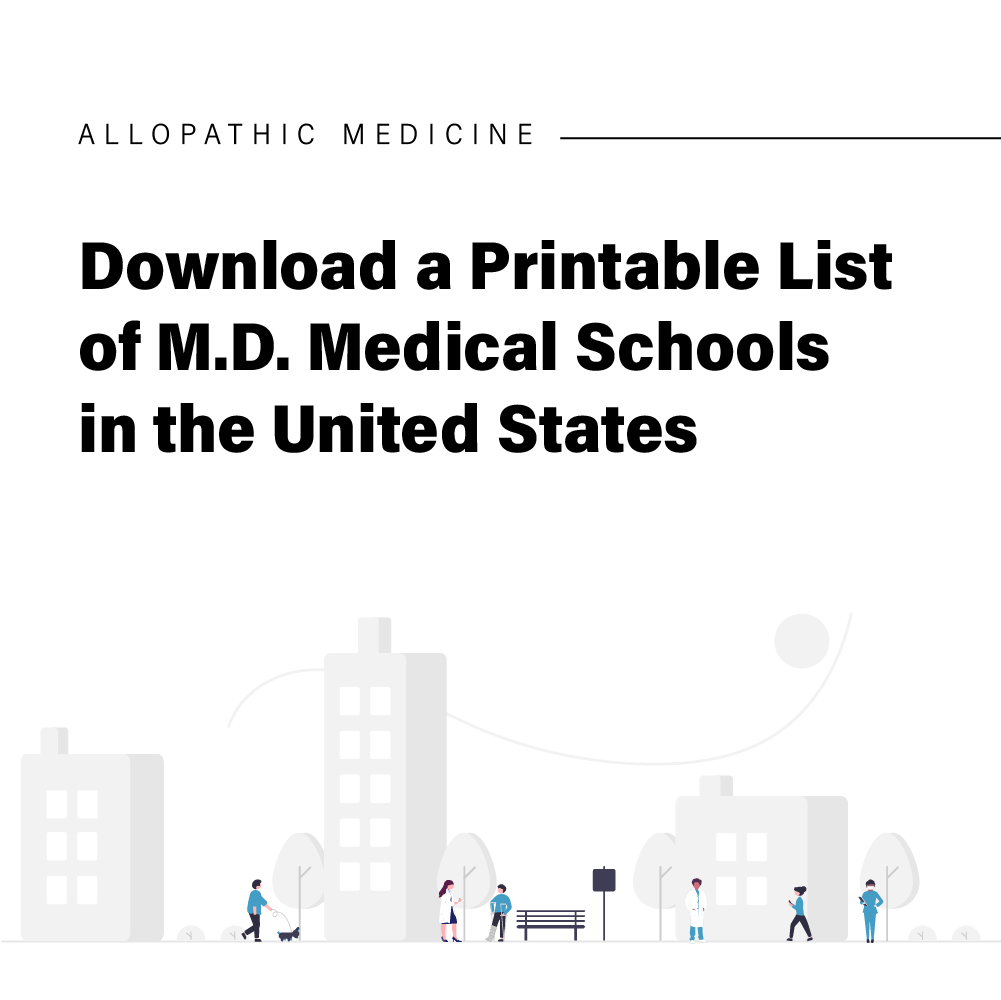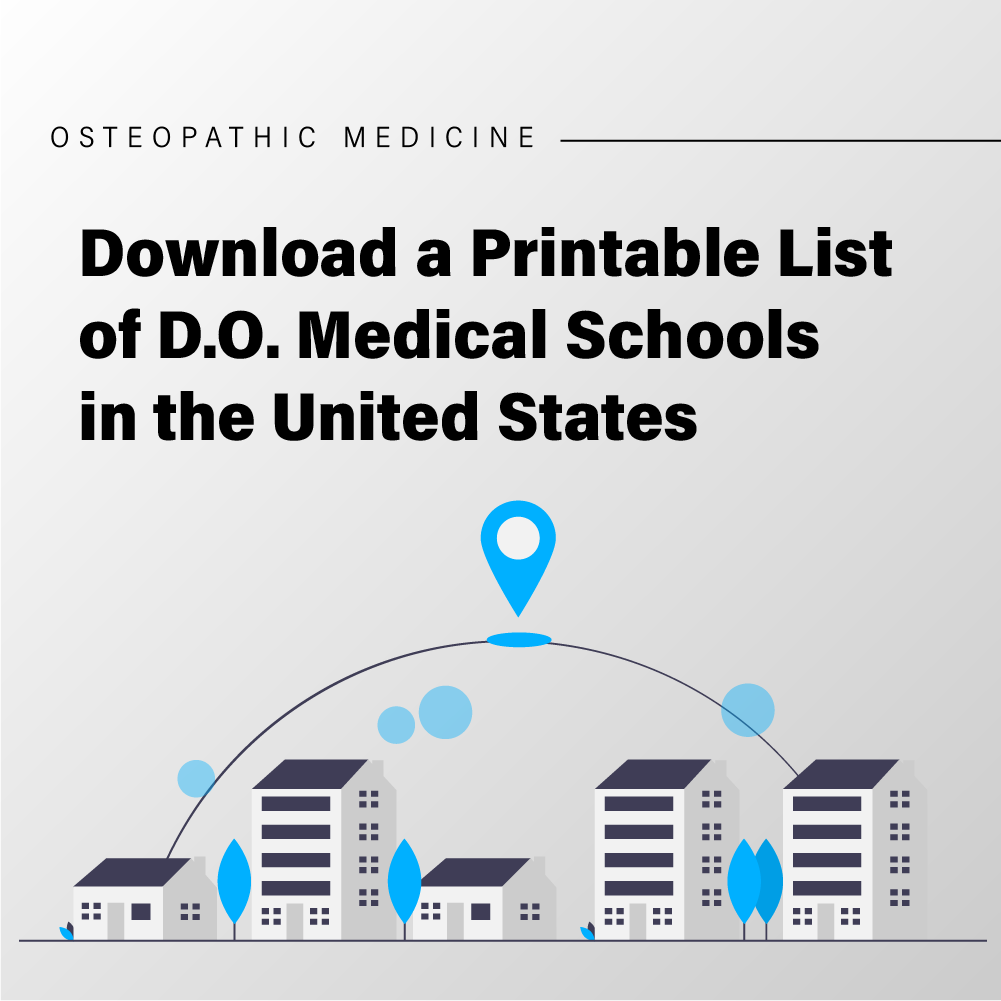An MD-MPH degree is a dual degree program that offers both a medical degree and a master’s of public health degree. In this guide, we will cover everything you need to know about MD-MPH degrees and programs.
Table of Contents
- What is an MD-MPH degree?
- How long do MD-MPH degrees take to complete?
- What job opportunities are available with this degree?
- What are the salary ranges for MD-MPH career paths?
- Does the MPH degree require a specialization?
- Is an MD-MPH right for you?
- Which medical schools offer MD-MPH degrees?
What is an MD-MPH degree?
An MD-MPH degree is a dual medical degree and a Master’s of Public Health degree. This degree prepares students to be physicians with an expertise in population health. MD-MPH physicians approach health as a population or community-based issue instead of an individual one. This perspective equips physicians to see the whole picture of a patient’s symptoms and treat health problems related to economic, cultural, religious, or social issues. Therefore, this dual degree helps you integrate the medical topics you learn in your MD program with the information you are learning about public health.
How long do MD-MPH degrees take to complete?
The duration of the MD-MPH depends on each programs’ requirements. Usually, students apply to the MPH degree during their second year of medical school. Then they begin MPH coursework during their third year. The coursework for the MPH degree takes a full year. Unless students decide to perform research in public health, their total time completing the MD-MPH dual degree is an average of 5 years. Check your program of interest for detailed timelines and criteria.
What job opportunities are available with this degree?
Graduates of MD-MPH programs are well-prepared for careers as physicians. They will efficiently be able to diagnose health problems and risk factors of individual patients and entire communities. In addition to being a physician, people with MD-MPH degrees can work in research, consulting, and policy.
The five most popular career paths for an MD-MPH degree are epidemiologist, public health educator, clinical researcher, biostatistician, and health service administrator.
Epidemiologists
Epidemiologists study outbreaks of disease, where they originate from, and how they affect communities in the short and long term. In turn, they also study how they can help prevent diseases and how those diseases are affected by specific bacteria, viruses, pathogens, and how they work. Epidemiologists are usually employed by government agencies such as the Centers for Disease Control (CDC).
Public Health Educators
Public Health Educators focus on delivering up-to-date and correct health information to communities. In other words, they focus on health communication in order to engage different populations and communities. This might include developing outreach programs, conducting workshops, and creating media content in health journals, magazines, and in digital resources.
Clinical Researchers
Clinical researchers are physician-scientists with a focus on clinical or translational medicine. Depending on their role in the clinic or laboratory, clinical researchers may be in charge of maintaining research regulations in the laboratory, running clinical trials, interacting with patients, and maintaining organized records of their trials.
Biostatisticians
Biostatisticians are trained to determine factors that impact health and diseases. They do so by applying statistics and mathematics to real biological data collected in research or clinical trials. In addition, biostatisticians study the effects and risk factors of medical treatments in clinical studies taking place in pharmaceutical companies, university research, hospital laboratories, agricultural firms, and other medical corporations.
Healthcare Administrators
Healthcare administrators are directors or managers of hospitals or similar organizations. In this role, they are responsible for running the hospital, keeping up with evolving health policies, managing budgets, running research trials, and managing employees as well. Although the setting is typically in hospitals, health care administrators do not interact with patients at all.
What are the salary ranges for MD-MPH career paths?
The national range of salaries for the careers described in the previous section are:
- Epidemiologist: $71k-140k
- Public Health Educator: $50-81k
- Clinical Researcher: $76-130k
- Biostatistician: $60-100k
- Health Service Administrator: $50-110k
Does the MPH degree require a specialization?
The MPH degree does not usually have a concentration requirement, but most programs do offer students the opportunity to complete a focus area of study. Depending on student interests and the program itself, specializations may include epidemiology, health policy, family or women’s health, preventive medicine, sociomedical sciences, and environmental health.
Is the MD-MPH degree right for you?
The Master of Public Health degree gives MDs the opportunity to learn about research study design, community health, epidemiology, biostatistics, and related topics. These graduate-level courses will give you a well-rounded view of community health and how it relates to your patients’ health. This joint degree will prepare you to research the causes, prevention, and control of diseases. If you are considering whether the MD/MPH path is right for you, try answering the following questions:
Do you want to do clinical research?
Many MDs pursue MPH degrees so that they can focus their practice in clinical trials or preventative medicine. Another focus area is infectious diseases and how they are affected by different environments.
Are you interested in healthcare policy or health management?
One of the easiest ways to decide if the MD/MPH is right for you is to consider your career options. Aside from epidemiology, one of the most popular career tracks is health care policy and management. This entails analysis of health care issues and delivery so that you can contribute to the legislation of health care delivery and outcomes.
Would you like to work in international healthcare?
Are you concerned about global health, third-world, or low-income countries? An MD/MPH degree will give you the framework you need to work abroad in marginalized communities to help with disease prevention, programs to boost community health services, and education.
Do you have a desire to work exclusively with underserved populations?
If you have an interest in protecting and improving the public health of rural and underserved communities, then this joint track may be right for you. Many MD/MPH physicians work in population and family health of low-income communities. This focus is different than international health care because it is focused on rural areas in America, as opposed to working countries worldwide.
The MD/MPH degree is a great option for students who want a robust understanding of factors that affect local and global health and who want to develop skills in policy advocacy, research, community practice, and leadership. However, it is possible to dedicate part of your career to low-income community health without this joint degree. The key is to consider what you want your career to consist of in the long term, and whether you would like to focus on being a practicing physician or if you would like to also be an advocate for community, family, or global health and policy.
Which medical schools offer MD-MPH degrees?
Here is a list of all the medical schools that offer MD/MPH degrees:
- Albany Medical College (ALBANY MED)
- Albert Einstein College of Medicine ( EINSTEIN MED
- Baylor College of Medicine (BCOM)
- Boston University School of Medicine (BU SOM)
- Brody School of Medicine at East Carolina University (ESU BRODY SOM)
- Case Western Reserve University School of Medicine (CWRU SOM)
- Donald and Barbara Zucker School of Medicine (ZUCKER SOM)
- Drexel University College of Medicine (DU COM)
- East Tennessee State University College of Medicine (ETSU COM)
- Eastern Virginia Medical School (EVMS)
- Emory University School of Medicine (EMORY MEDICINE)
- Florida International University Herbert Wertheim College of Medicine (FIU COM)
- George Washington University School of Medicine (GW SMHS)
- Harvard Medical School (HARVARD MED)
- Icahn School of Medicine at Mount Sinai (ICAHN MOUNT SINAI)
- Indiana University School of Medicine (IU SOM)
- Jacob School of Medicine and Biomedical Sciences at University of Buffalo (JACOB MED UB)
- Keck School of Medicine at the University of Southern California (KECK MED USC)
- Lewis Katz School of Medicine at Temple University (TEMPLE MED SCHOOL)
- Louisiana State University School of Medicine in New Orleans (LSU HEALTH NO)
- Loyola University Chicago Stritch School of Medicine ( SSOM)
- Mcgovern Medical School at the University of Texas Health Science Center at Houston (UTH SOM)
- Medical College of Georgia at Augusta University (MCG)
- Medical College of Wisconsin (MCW)
- Meharry Medical College (MEHARRY MEDICAL)
- Michigan State University College of Human Medicine(MSUMD)
- Morehouse School of Medicine (MSM)
- New York Medical College (NYMC)
- New York University Grossman School of Medicine (NYU GROSSMAN SOM)
- Northwestern University of Feinberg School of Medicine (NU FEINBERG SOM)
- Ohio State University College of Medicine (OSU COM)
- Oregon Health Science University School of Medicine (OHSU SOM)
- Perelman School of Medicine at University of Pennsylvania (UPENN Med)
- Renaissance School of Medicine at Stonybrook University (STONYBROOK SOM)
- Rutgers New Jersey Medical School (NJMS)
- Rutgers Robert Wood Johnson Medical School (RWJMS)
- Saint Louis University School of Medicine (SLU SOM)
- Sidney Kimmel Medical College of Thomas Jefferson University (JEFFERSON U)
- Southern Illinois University School of Medicine (SIU SOM)
- Stanford University School of Medicine (STANFORD MED)
- State University of New York Downstate Medical Center College of
- Downstate College of Medicine (SUNY DOWNSTATE MED)
- State University of New York Upstate Medical University (SUNY UPSTATE MED)
- Texas Tech University Health Sciences Paul L Forester School of Medicine (TTUHSC)
- Texas Tech University Health Sciences Center School of Medicine at Lubbock (TTUHSC)
- University of Texas Health Science Center at San Antonio Joe R and Teresa Lozano Long School of Medicine (UT HEALTH SA SOM)
- University of Toledo College of Medicine and life Sciences (U of TOLEDO COM)
- Warren Alpert Medical School of Brown university (BROWN MED)
- Tufts University School of Medicine (TUFTS MED)
- Uniformed Services University of Health Sciences F. Edward Herbert School of Medicine (UCUHS)
- University of Alabama School of Medicine (UAB SOM)
- University of Alberta Faculty of Medicine and Dentistry (UALBERTA Med)
- University of Arizona College of Medicine Phoenix (UAZ COM PHX)
- University of Arkansas for Medical Science College of Medicine (UAMS)
- University of California, Irvine School of Medicine (UCI SOM)
- University of California, Los Angeles, David Geffen School of Medicine (UCLA SOM)
- University of California, San Diego School of Medicine (UCSD SOM)
- University of California, San Francisco School of Medicine (UCSF SOM)
- University of Central Florida, College of Medicine (UCF COM)
- University of Chicago Division of Biological Sciences the Pritzker School of Medicine (UC SOM)
- University of Cincinnati College of Medicine (UC COM)
- University of Colorado School of Medicine (CU SOM)
- University of Connecticut School of Medicine(UCONN SOM)
- University of Florida College of Medicine (UFL COM)
- University of Illinois College of Medicine (UI COM)
- University of Iowa Roy J. and Lucille A. Carver College of Medicine (IOWA COM)
- University of Kansas School of Medicine (KU SOM)
- University of Kentucky College of Medicine (UKY COM)
- University of Maryland School of Medicine (UM SOM)
- University of Miami Leonard M Miller School of Medicine (U MIAMI SOM)
- University of Michigan Medical School (U MICH MS )
- University of Minnesota Medical School (UMMS)
- University of Nebraska College of Medicine (UNMC)
- University of Nevada, Reno, School of Medicine (UNR SOM)
- University of New Mexico School of Medicine (UNM SOM)
- University of North Carolina School of Medicine (UNC SOM)
- University of Pittsburgh School of Medicine (PITT SOM)
- University of Rochester School of Medicine and Dentistry (U ROCHESTER MED)
- University of Texas at Austin Dell Medical School (DELL MS)
- University of Texas Rio Grande Valley School of Medicine (UTRGV SOM)
- University of Texas Southwestern Medical School (UTSW)
- University of Utah School of Medicine (UofU SOM)
- University of Virginia School of Medicine (UV SOM)
- University of Washington School of Medicine (UW SOM)
- University of Wisconsin School of Medicine and Public Health (UWSMPH)
- Vanderbilt University School of Medicine (VU SOM)
- Virginia Tech Carilion School of Medicine (V TECH SOM)
- Washington University in St Louise School of Medicine (WUSTL SOM)
- Wayne State University School of Medicine (WAYNE SU SOM)
- West Virginia University School of Medicine (WVU SOM
- Wright State University Boonshoft School of Medicine (WSU BOONSHOFT SOM)
Further reading



